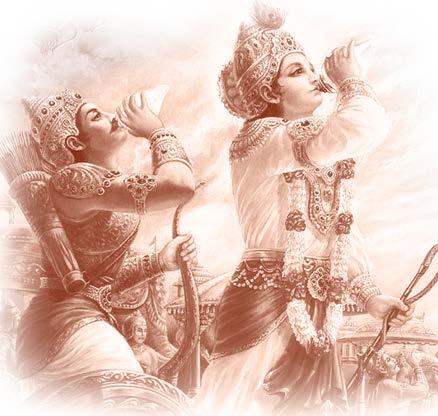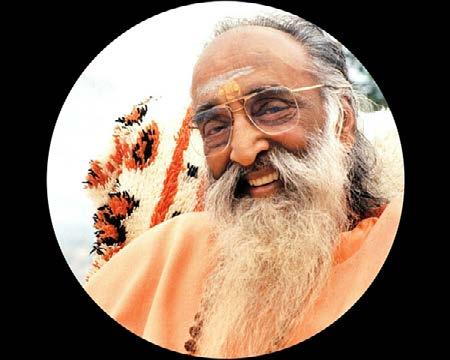
9 minute read
5. Gita Reflections
Gita Reflections
vgekRek xqMkds’k loZHkwrk’k;fLFkr%A vgekfn’p e/;’p
Advertisement
HkwrkukeUr ,o pAA

(Gita 10/20)
Swamini Samatananda
I am the Self, the master of the sense organs, who resides in the hearts of all beings and I am the cause of the creation, the sustenance, and resolution of all beings/things.

Gita Reflections
Sangati : The tenth Chapter of the Geeta is an awesome subject of discussion between Sri Krishna and his beloved disciple Arjuna. It is a subject that opens the doors of divinity even for an amateur student of spiritual knowledge. Here Arjuna goes on to request Sri Krishna to describe to him in details, the glories of His Divine Self, as his heart wishes to know more and more about him. Sri Krishna goes on to say that there is no end to a detailed description of His divine glories yet he will be happy to speak of a few which stand out, which speak of the divinity for themselves.

As Bhagwan commences the chapter of his divine glories He begins with the ultimate Glory of Himself, which is not only the essence of his very own existence but it is the esential existence of all inert and living beings. It is the substratum, the supreme essence of all beings as Sachidananda-pure existence, pure consciousness and blissful nature of all that is seen-unseen, living and inert, moving and immoving.
Ahamatma Gudakesha Sarvabhootaashayasthitaha:
Sri Krishna adresses Arjuna with a very unique name-Gudakesha. Gudakesha is the one who has conquered sleep, implying that Arjuna is a higly alert student, curious to know the truth of various facts of life. He has overcome tamoguna and is awake and alert as he expresses his curiosity to know more and
Gita Reflections
more. Sri Krishna says-Oh! Gudakesha. I am the Atma-the Self residing in the heart of all beings. It is interesting to see here that Bhagwan raises the curtains of his glories by first speaking of the most subtle glory that is the ‘Atma’ the Self which is the existential blissful life principle of all living and non-living beings, of all moving and immoving beings, and of all that is seen and unseen. Life itself is the first manifestation of all
of Ishvara’s glory. I exist, I am alive, I can see, talk, eat drink, interact feel the joys and what not. What more do we need to see the glory of the Lord. It is such a great irony that we give so much importance to the objective world, trying to know it, desire it, acheive it, experience it, that we ignore the very life priciple due to which ‘I’ am living and experiencing the entire creation. Everything comes only after I have enlivined it with my consciousness and awareness. First I wake up and then everything wakes up to me. This is the beauty of the Self. First I am of the nature of bliss then alone everything gives me joy. I am of the nature of consciousness then alone the knowledge of everything unfolds for me. This is the essential nature and supreme divinity of the Self which Bhagwan Krishna is revealing here. ‘Atma’ is not only the glory of Ishvara but it is the glory of everything that exists. Unfortuately it is a very selected few who are inspired to know the glory of the Self. Sri Krishna says-come to see the glorious nature of the Self.

Gita Reflections
Aham aadishcha madhyancha bhootanaam anta eva cha:
Ishvara is the undifferentiated intelligent and material cause that gives existence to one and all. A cause manifests in the effect of every existence. An effect does not have its own independent existence. It exists only because of the cause. In fact the cause itself manifests as the effect. Ishvara is pure existence, the blissful life principle. It has been there even before the manifestation of something. It expresses itself as ‘Is-ness’ in everything. The book is; the table is; the computer is; and so on. Let’s take the example of gold jewellery. In the begining there is only gold. But then the gold itself appears to have become a gold chain or a gold bangle. A chain is nothing but gold, a bangle’s substratum is gold. When the chain or bangle is dissolved then it is only the form and name that have been dissolved, the gold remains as it is- ‘untouched’. Similarly Sri Krishna as Ishvara says-I am the adi-madhya and anta of everything. Everything is born of me, is sustained in me and dissolves back in me. In this manner with referance to the creation and dissolution Ishvara is the cause of the entire creation. The entire creation is like a play of waves in the ocean.

In this manner Sri Krishna divinises the vision of looking at everything in the world.
If the Atma is the substratum of all that exists, then surely all that exists is worth it’s while. We must respect every form of
Gita Reflections

life how ever little it may be. We must learn to see the divinity in every form of life. Every manifestation even if it is just a blade of glass has its unique beauty and role to play in the creation. All manifestations are complimentary and support the functioning and existence of each other in the universal cycle. Seeing the glories of the Lord and remembering the Lord in and through them is the first step to then seeing Ishvara’s presence in everything.

- 34The Art Of Man Making
The Secret of Service

P.P. Gurudev Swami Chinmayanandaji

The Art of Man Making
Krishna announces now the great “secret of success” in all mighty undertakings-be they spiritual or material. This verse is the very back-bone of the third chapter of the Bhagwad Geeta. The Lord reveals, *Renouncing all actions in me, with the mind centred on the Self-without hope ad ego, freed from fever-fight on. The most pregnant verse in all scriptures sometimes read as the most flippant. As it stands, this verse sounds quite ridiculous. But there are chapters of suggestions packed in every phrase here employed.
“Renouncing all actions in me” (mayi sarvani karmani sannyasya). Man acts always in a spirit of dedication (arpanbuddhi). We generally act dedicated to the wife (bharyarpan), or dedicated to the son (putrarpan), etc. Here Krishna insists that we should undertake all actions dedicated to Him, the infinite Lord. Our capacities then increase according to the glory of the altar of our dedication. Thus, as an ambassador of a country, an ordinary man can sign for his country, trade treaties, etc.-it is not he, the person, who is sining, but the country he represents.

When we “dedicate ourselves to Him” and act, always as His deputies in life, we draw unto ourselves infinite strength, power, capacity and intelligence. Be His servant, He being the mighty ideal of your heart.
The Art of Man Making
Now the question is, how is one to gain this continuous spirit of dedication? This is possible if we live with the mind centred on the Self (adhyatmachetasa). The distractions here come from our identification with the demands of the flesh, the urgencies of the mind or the restlessness of the intellect. But with the
two procesesses of 1) intellectual dedication to the Self, and of 2) mental centredness in our ideal, we draw into our bosom, from some unexpected source in ourselves, an unbelievable quantum of fresh vitality, an active surge of irresistable enthusiasm, and the dash to face courageously all vicissitudes.
Even when we have the joyous tide of energetic fervour to act, to strive, to sweat and gain our goals, often we find, in the very fields of our achievements, our inner fountains dwindle and soon dry up completely. Why? For example, if water is not flowing from the tap in the wash basin, we can safely conclude that either there is a clogging somewhere along the pipe, or there is a leakage in the system. Similarly, when your enthusiasm in a programme of work wanes, it is clear that your vitality is being dissipated en route. There are only three channels through which personality-dissipation takes place. They are indicated by the Lord when he says, “without hope and ego” (niraasheer nirmamo bhootva) and “freed from fever” (vigatajwarah) act on in life.

The Art of Man Making
Hope (asha) is “expectation for something to gain in a future period of time”. To grow thus anxious for the future-which is, in fact, the result of the present dynamic action-is a waste, a ruinous dissipation. Similarly, our egocentric identity is nothing but “our total memories of the past experiences”. Thus, the exhortation “without egocentric relationships” (nirmamah) means without allowing our present mood to be disturbed with “regrets of the past”. To remember the past and ruminate over it with regret-is another channel of dissipation through which our efficiences ooze out.
In addition to this, we have a knack of exhausting ourselves with our “excitements in the present”. In the busy clashes of urgencies in a fast energetic life, you are called upon to attend to hosts of duties, crowds of different activities, innumerable functions and varieties of relationships. So Krishna rightly points out “freed from fever” (vigatajwarah). Feversih excitements lower our abilities. Avoid them: be calm, serene, cool-and act quietly: efficiency is then maintained at a very high pitch in

us.
An individual of steady application is exhorted by Krishna to fight (yudhyasva) where the battle is with your vicissitudes and problems. Having thus adjusted your inner equipments and their functions, bring the newly-discovered energies in fight-
The Art of Man Making
ing down the forces of evil around you and chasten the cultural and political life of the community.
This technique is equally available for both material successes and for bringing about one’s spiritual unfoldment. Unconscious dissipations in unintelligent “regrets of the past” and “anxieties for the future”, and “excitements in the present” keep many of us at the levels of failures, disappointments and despairs. Have faith in an ideal or idol, and surredering yourself to it, act diligently.
Success is sure. This way of life, only the youth of the country can practise and master. In this discipline lie their achievements and the ultimate glory of the nation in the years to come.








